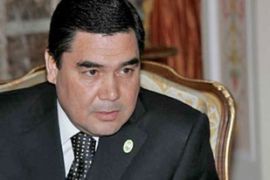Little choice in Turkmenistan poll
All candidates in the paliamentary election declare support for the president.

Gurbanguli Berdymukhamedov became president in 2006 after the death of Saparmurat Niyazov, who forged a personality cult that saw months of the year renamed after himself and his mother, and a spiritual guide he authored become mandatory for students and government workers.
‘Pluralism and openess’
Berdymukhamedov rolled back some of the decrees which had celebrated the previous leader and vowed to increase democracy and foreign investment.
|
“It does not matter who gets elected. The president has the final say” Osman-aga, |
“This campaign stands out for its pluralism, openness and the activeness of the citizens,” an election official told the AFP news agency, requesting anonymity.
In September, the People’s Council, a 2,507-member assembly of presidential appointees, town elders and others, voted to abolish itself and cede most of its powers to an expanded parliament.
But more than half of the 288 candidates running for the parliament’s 125 seats on Sunday are from the Democratic Party, while the others have been drawn from state-controlled women’s and veterans’ organisations, trade unions and a youth group.
All of them receive state funding for the campaign as no other form of political funding is allowed under Turkmenistan’s laws.
“It does not matter who gets elected. The president has the final say,” Osman-aga, who herds camels in a remote desert area, told the Reuters news agency.
Contest ‘impossible’
The Organisation for Security and Co-operation in Europe has not sent only three observers to monitor the vote, saying a genuine contest was impossible.
Human Rights Watch said in a report last month: “The conditions are not in place to hold a free and fair election that would be a meaningful reflection of the will of the people.”
The presence of foreign media also is limited as many journalists were unable to get permission to report there.
The run-up to the election in the former Soviet state has seen little campaigning and garnered little coverage on state-run television.
“There are very few billboards around the city … I still don’t know who I’m supposed to vote for,” Maral, a resident of Ashgabat who declined to give her surname for fear of official intimidation, told the Associated Press news agency.